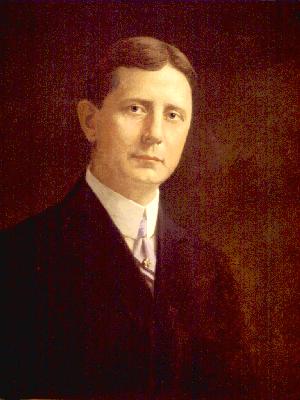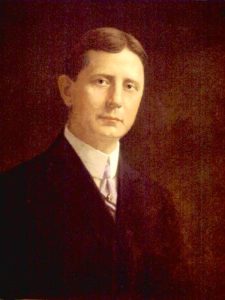Ruffin Pleasant
As governor of Louisiana from 1916 until 1920, Democrat Ruffin G. Pleasant oversaw Louisiana’s efforts during World War I (1914-1918).

Courtesy of Wikimedia Commons
Ruffin G. Pleasant. Unidentifed
As governor of Louisiana from 1916 until 1920, Democrat Ruffin G. Pleasant oversaw Louisiana’s efforts during World War I (1914-1918), which ranked among the largest in the nation in terms of both financial support and individual service. Elected to office with the backing of New Orleans mayor Martin Behrman and the conservative Regular Democratic Organization, Pleasant proved loyal to them throughout his term—so loyal that critics labeled him a pawn in their political machine. Later in his career he was an outspoken critic of Huey P. Long.
Ruffin Golson Pleasant was born in Shiloh (in Union Parish) on June 2, 1871, to Benjamin Franklin Pleasant and Martha Washington Duty Pleasant. He attended Ruston College and Mount Lebanon College in Pineville before studying at Louisiana State University (LSU), where he was captain of the football team in 1893. He played in the first game between LSU and Tulane University, a now legendary rivalry. Pleasant later studied law at Harvard and Yale universities before serving as lieutenant colonel of the 1st Louisiana Regiment of Infantry during the Spanish-American War (1898). In 1906 he married Anne Ector, founder of Pleasant Hall, a coed private school in Shreveport.
After practicing law in Shreveport, Pleasant served as the city attorney from 1902 until 1908. He went on to become state attorney general in 1912, a position he held until he was elected governor in 1916. With Behrman’s support, Pleasant defeated Lieutenant Governor Thomas O. Barret in the Democratic primary and then John M. Parker, a reform candidate, in the general election.
During his term, Pleasant worked to mobilize support for America’s entry into World War I in April 1917. Eleven major military installations were constructed as part of the state’s war efforts and New Orleans’s shipbuilding and port facilities were updated. Ultimately more than 71,000 Louisianans fought in the war and at least 1,400 sacrificed their lives. Much to the dismay of many of his New Orleans supporters, Pleasant also endorsed prohibition when the U.S. Congress passed the Volstead Act in 1917. At the end of his term, Pleasant supported calls for a constitutional convention in 1921, to which he served as a delegate.
After leaving office, Pleasant returned to Shreveport to practice law but remained politically active. In 1924 he served as a delegate at large to the Democratic National Convention. Though he supported Huey P. Long in the 1928 gubernatorial election, Pleasant eventually became an outspoken participant in the anti-Long movement. He died in Shreveport on September 12, 1937.
Adapted from Sidney Romero’s entry for the Dictionary of Louisiana Biography, a publication of the Louisiana Historical Association in cooperation with the Center for Louisiana Studies at the University of Louisiana, Lafayette.
Sources: Roy Glashan, American Governors and Gubernatorial Elections, 1775-1975 (1975); Miriam G. Reeves, The Governors of Louisiana (1962); interview, July 5, 1983, with John R. Pleasant; letter, July 4, 1983, from Mrs. Thomas Haller Jackson, niece of Anne Ector Pleasant.
